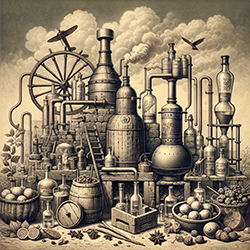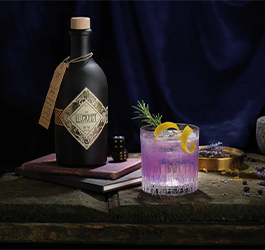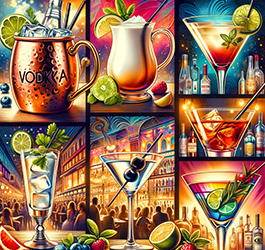The Ultimate Guide to Vodka: History, Qualities, and Top Brands
Introduction
Vodka, a spirit celebrated for its versatility and purity, holds a revered place in the hearts of enthusiasts and casual drinkers alike. Its clear appearance belies a complex history and a rich tapestry of cultural significance that spans the globe. Unlike other spirits that wear their flavours on their sleeves, vodka's charm lies in its subtlety, making it a favourite base for cocktails and a staple in bars and homes worldwide. This guide delves into vodka's journey from its humble beginnings to becoming a global phenomenon, exploring what makes it a distinguished drink, the brands that have risen to prominence, and the future trends shaping its evolution.
The Origins of Vodka

The story of vodka is as intriguing as it is disputed, with its origins shrouded in the mists of history. Believed to have been first distilled in the regions of modern-day Poland or Russia between the 8th and 9th centuries, vodka was initially used for medicinal purposes before gaining popularity as a beverage. The word "vodka" itself, derived from the Slavic word "voda" meaning water, reflects the spirit's essential purity. Over the centuries, the production techniques evolved, but the essence of vodka—a spirit distilled to high purity—remained unchanged. Vodka's journey from a local specialty to a global staple is a testament to its adaptability and the universal appeal of its clean taste.
What Makes Vodka Unique?

The uniqueness of vodka lies in its distillation and purification process, which is designed to remove impurities and yield a spirit that is almost entirely ethanol and water. This process starts with fermentation, where sugars are converted into alcohol using a variety of ingredients like grains, potatoes, or even grapes. What sets vodka apart is the extensive distillation and filtration it undergoes. Through methods like column distillation, producers achieve a high degree of purity, often distilling vodka multiple times. The final step, filtration through materials like charcoal, further refines the spirit, removing any residual flavours and impurities. The result is a clear, smooth spirit that serves as a versatile canvas for mixologists and a subtle, refined option for those who appreciate its minimalist appeal.
The Art of Drinking Vodka

The appreciation of vodka extends beyond its taste to the rituals and traditions that accompany its consumption. In its traditional heartlands of Eastern Europe, vodka is often enjoyed neat, chilled, and in good company. This method showcases the spirit's purity and subtle flavour nuances, differing significantly from the Western preference for vodka as a cocktail base. The Moscow Mule, Bloody Mary, and Vodka Martini are just a few examples of cocktails that owe their existence to vodka's ability to blend seamlessly with other flavours. Yet, regardless of whether it's sipped straight from a frosted glass or mixed into a vibrant cocktail, the art of drinking vodka is about savouring the moment and the company you're with.
Understanding Vodka Varieties

Vodka's simplicity is deceptive, masking a diversity that aficionados cherish. The classic, unflavoured vodka, distilled to near-perfection, offers a clean palate for discerning the subtle differences imparted by its base ingredients—be it grain, potato, or even grapes. On the other hand, flavoured vodkas have surged in popularity, introducing a playful array of tastes ranging from citrus to peppercorn, catering to a broader audience seeking variety. The choice of ingredients and the distillation process play critical roles in defining the character of the vodka, with each variety offering a unique profile that appeals to different palates and occasions.
Selecting a Quality Vodka

Navigating the vast selection of vodkas on the market can be daunting, but a few key considerations can help guide your choice. Quality vodka is characterised by its smoothness, clarity, and a clean finish, qualities that are often a result of meticulous distillation and filtration processes. While price can be an indicator of quality, it is not the sole determinant; many mid-range vodkas offer exceptional purity and taste. When selecting a vodka, consider its base ingredient and origin, as these can influence its flavour profile. Moreover, take the time to read reviews and recommendations, but ultimately, personal taste preferences should guide your selection. Experimenting with different brands and varieties is part of the joy of discovering the subtleties that make vodka a fascinating spirit.
Top Vodka Brands and Why They Stand Out

The world of vodka boasts an array of brands that have carved out niches for themselves, ranging from luxury to budget-friendly options, each with its own story and character. Iconic brands like Smirnoff and Absolut have become household names, offering consistent quality and versatility for cocktails. Premium labels such as Ciroc, Grey Goose and Belvedere are celebrated for their exceptional smoothness and purity, often preferred by connoisseurs for sipping neat or in refined cocktails. Artisanal brands, leveraging unique distillation techniques and local ingredients, have also gained prominence, offering distinctive flavours and stories that appeal to those seeking something beyond the mainstream. What unites these top brands is a commitment to quality and a deep understanding of vodka's heritage and potential.
Sustainable and Eco-Friendly Vodka Production

In response to growing environmental concerns, many vodka producers are embracing sustainable practices, from sourcing organic ingredients to implementing energy-efficient distillation processes. Brands like Absolut have led the way in reducing carbon footprints and promoting sustainable farming practices. Meanwhile, smaller craft producers are innovating with local, non-traditional ingredients and closed-loop systems that minimise waste. This shift towards sustainability not only reflects a broader societal move towards eco-consciousness but also introduces new flavours and stories into the vodka market, resonating with consumers eager to support ethical and environmentally friendly brands.
The Future of Vodka

As we look towards the future, vodka continues to evolve, driven by innovation and changing consumer tastes. The rise of craft distilleries is pushing the boundaries of traditional vodka production, introducing new flavours and distillation methods. The demand for organic and locally sourced ingredients is shaping the industry, leading to a more diverse and sustainable range of products. Moreover, the cocktail culture's resurgence is inspiring mixologists to explore vodka's versatility further, crafting creative drinks that highlight its unique qualities. As vodka adapts to the preferences of a new generation of drinkers, its future appears as clear and promising as the spirit itself.
Conclusion

Vodka's journey from a medicinal elixir to a global spirit staple is a testament to its enduring appeal and adaptability. Its unique qualities, from the purity of distillation to the diversity of varieties, offer something for every palate. As vodka continues to evolve, both in production and consumption, it remains a symbol of celebration, creativity, and cultural connection. Whether enjoyed neat in the traditional manner or mixed into an innovative cocktail, vodka invites us to explore its depths and enjoy its subtleties. Cheers to vodka – a spirit that transcends borders and brings us together in appreciation of its timeless charm.














Comments